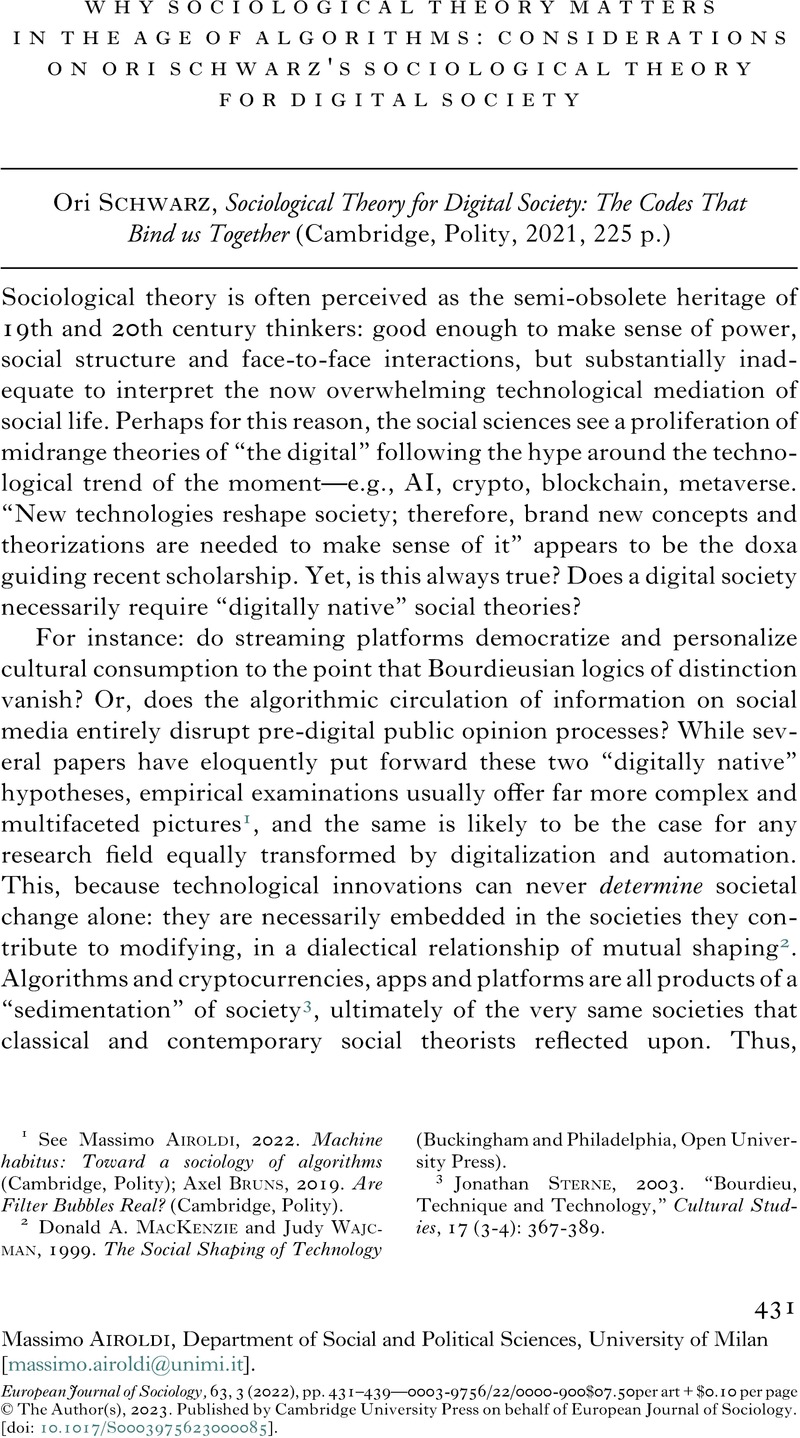No CrossRef data available.
Article contents
Why Sociological Theory Matters in the Age of Algorithms: Considerations on Ori Schwarz’s Sociological Theory for Digital Society - Ori Schwarz, Sociological Theory for Digital Society: The Codes That Bind us Together (Cambridge, Polity, 2021, 225 p.)
Review products
Published online by Cambridge University Press: 23 February 2023
Abstract

- Type
- Book Review
- Information
- European Journal of Sociology / Archives Européennes de Sociologie , Volume 63 , Issue 3 , December 2022 , pp. 431 - 439
- Copyright
- © The Author(s), 2023. Published by Cambridge University Press on behalf of European Journal of Sociology
References
1 See Massimo Airoldi, 2022. Machine habitus: Toward a sociology of algorithms (Cambridge, Polity); Axel Bruns, 2019. Are Filter Bubbles Real? (Cambridge, Polity).
2 Donald A. MacKenzie and Judy Wajcman, 1999. The Social Shaping of Technology (Buckingham and Philadelphia, Open University Press).
3 Jonathan Sterne, 2003. “Bourdieu, Technique and Technology,” Cultural Studies, 17 (3-4): 367-389.
4 Kate Orton-Johnson and Nick Prior, eds. 2013. Digital sociology: Critical perspectives. Springer; Noortje Marres, 2017. Digital sociology: The reinvention of social research (Cambridge, Polity).
5 Page 10, in John Law, 1990. “Introduction: Monsters, Machines and Sociotechnical Relations,” The Sociological Review, 38 (1 suppl): 1-23.
6 Nathan Jurgenson, 2012. “When atoms meet bits: Social media, the mobile web and augmented revolution,” Future internet, 4 (1): 83-91.
7 See, for instance, Karin Knorr Cetina, 2009. “The Synthetic Situation: Interactionism for a Global World,” Symbolic Interaction, 32 (1): 61-87; Boyd Danah, 2008. Taken Out of Context: American Teen Sociality in Networked Publics, Doctoral dissertation, University of California, Berkeley; Joshua Meyrowitz, 1986. No sense of place: The impact of electronic media on social behavior (Oxford, Oxford University Press).
8 Danah 2008, cf. infra.
9 Mark S. Granovetter, 1973. “The strength of weak ties,” American Journal of Sociology, 78 (6): 1360-1380.
10 Bruno Latour, 2005. Reassembling the Social: An Introduction to Actor-Network-Theory (Oxford, Oxford University Press).
11 Manuel Castells, 1996. The Rise of the Network Society (city ?, Blackwell).
12 Fabian Muniesa, Yuval Millo and Michel Callon, 2007. “An introduction to market devices,” The Sociological Review, 55 (2 suppl): 1-12.
13 W. Lance Bennett and Alexandra Segerberg, 2013. The logic of connective action: Digital media and the personalization of contentious politics (Cambridge, Cambridge University Press).
14 Andrew Hoskins, 2009. “Digital network memory”, in A. Erll and A. Rigney, eds, Mediation, remediation and the dynamics of cultural memory (Berlin, De Gruyter: 91-106).
15 Latour 2005, cf. infra; John Law, 1990, cf. infra; Airoldi 2022, cf. infra.
16 Pierre Bourdieu, 1986. “The Forms of Capital”, in J. Richardson, ed., Handbook of Theory and Research for the Sociology of Education (New York, Greenwood Press: 241-258).
17 Scott Lash, 2007. “Power after Hegemony: Cultural Studies in Mutation?,” Theory, Culture & Society, 24 (3): 55-78.
18 Page 788, in Michel Foucault, 1982. “The subject and power,” Critical Inquiry, 8 (4): 777-795.
19 Shoshana Zuboff, 2019. The Age of Surveillance Capitalism: The Fight for a Human Future at the New Frontier of Power (New York, PublicAffairs).
20 Pages 78-79, in Airoldi 2022, cf. infra.
21 Alessandro Delfanti, 2021. “Machinic dispossession and augmented despotism: Digital work in an Amazon warehouse,” New Media & Society, 23 (1): 39-55; Katherine C. Kellogg, Melissa A. Valentine and Angele Christin, 2020. “Algorithms at work: The new contested terrain of control,” Academy of Management Annals, 14 (1): 366-410.
22 Ilir Rama, 2022. For a Sociology of Affordances: the Social Situation across Digital Environments, Doctoral dissertation, NASP, University of Milan.
23 Meyrowitz 1986, cf. infra.
24 Airoldi 2022, cf. infra.
25 Ibid.
26 Marion Fourcade and Fleur Johns, 2020. “Loops, ladders and links: the recursivity of social and machine learning,” Theory and Society, 49 (5): 803-832.
27 David Beer, In press. “The problem of researching a recursive society: algorithms, data coils and the looping of the social,” Big Data and Society.
28 Safiya Umoja Noble, 2018. Algorithms of Oppression (New York, New York University Press); Airoldi 2022, cf. infra.
29 Law 1990, cf. infra.
30 Iyad Rahwan, Manuel Cebrian, Nick Obradovich, Josh Bongard, Jean-François Bonnefon, Cynthia Breazeal, Jacob W. Crandall et al. 2019. “Machine behaviour”, Nature, 568 (7753): 477-486.
31 Page 478, in Rahwan et al. 2019, cf. infra.
32 Bourdieu, 1986, cf. infra. “The Forms of Capital”, in J. Richardson, ed., Handbook of Theory and Research for the Sociology of Education (New York, Greenwood Press: 241-258); Airoldi 2022, cf. infra.
33 Elena Esposito, 2017. “Artificial Communication? The Production of Contingency by Algorithms,” Zeitschrift für Soziologie, 46 (4): 249-265.




